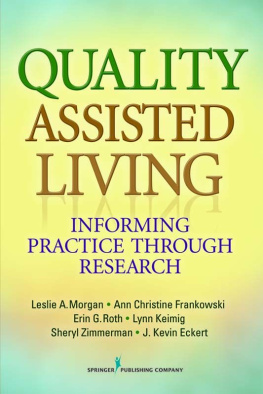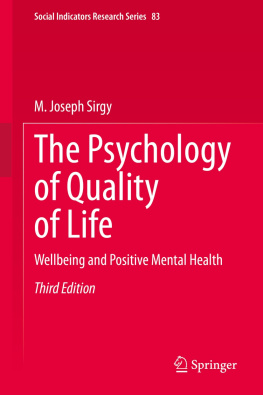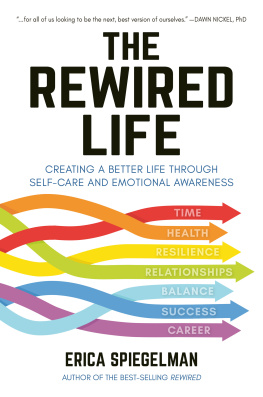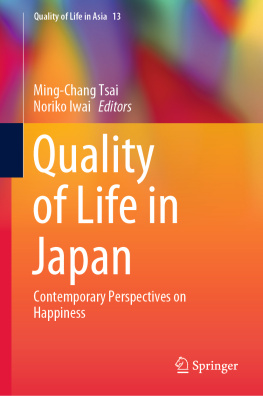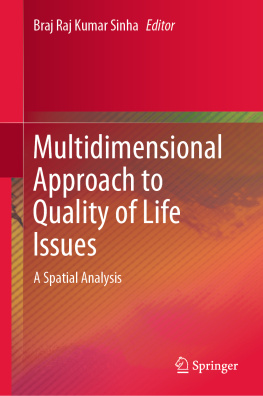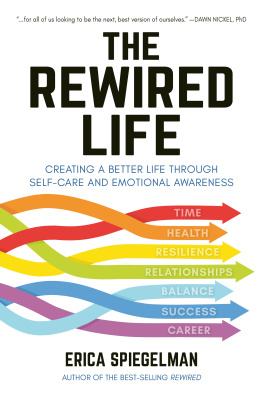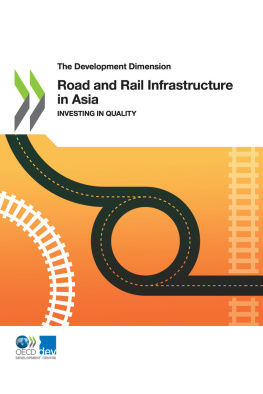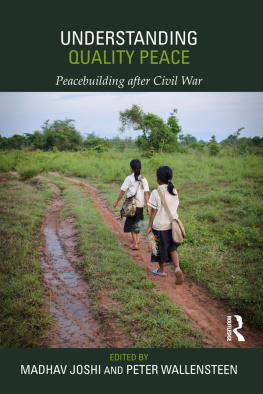
Pursuing Quality of Life
From anxieties over worklife balance and entangling technologies, to celebrations of cool jobs and great places to live, quality of life frames the ways we enhance our lives and legitimate social change today. But how does the idea of quality of life envision the greater good, and what gets lost as a result? This book provides the critical framework for understanding the ideas contexts and tensions that is conspicuously missing in popular discussions, professional activities, and scholarly research on quality of life. With multiple case studies taken across North America and Europe, it provides a sociological perspective on the contradictory ways we talk about and pursue quality of life in relation to technology, consumerism, family, work, public space, rural ways of life, and ultimately the final years of life. Drawing on contemporary and classical social theory, it provides an incisive account of the historical shifts in developed societies over the last half-century that have transformed our views and pursuits of quality of life. Originally a promise to undertake collective effort and pursue social justice at a moment of unprecedented opportunity, quality of life now enshrines a solipsistic ideal with which to accommodate the storms of market forces and political failure.
Leonard Nevarez is an associate professor of sociology at Vassar College. He is the author of New Money, Nice Town: How Capital Works in the New UrbanEconomy (2003).
Pursuing Quality of Life
From the Affluent Society
to the Consumer Society
Leonard Nevarez
First published 2011
by Routledge
270 Madison Avenue, New York, NY 10016
Simultaneously published in the UK
by Routledge
2 Park Square, Milton Park, Abingdon, Oxon OX14 4RN
Routledge is an imprint of the Taylor & Francis Group, an informa business
This edition published in the Taylor & Francis e-Library, 2011.
To purchase your own copy of this or any of Taylor & Francis or Routledges
collection of thousands of eBooks please go to www.eBookstore.tandf.co.uk.
2011 Taylor & Francis
The right of Leonard Nevarez to be identified as author of this work
has been asserted by him in accordance with sections 77 and 78 of the
Copyright, Designs and Patents Act 1988.
All rights reserved. No part of this book may be reprinted or
reproduced or utilised in any form or by any electronic,
mechanical, or other means, now known or hereafter
invented, including photocopying and recording, or in any
information storage or retrieval system, without permission in
writing from the publishers.
Trademark Notice: Product or corporate names may be trademarks
or registered trademarks, and are used only for identification and
explanation without intent to infringe.
Library of Congress Cataloging in Publication Data
Nevarez, Leonard.
Pursuing quality of life : from the affluent society to the consumer society /
Leonard Nevarez.
p. cm.
Includes bibliographical references.
1. Quality of lifeCase studies. 2. Consumption (Economics)
Case studies. I. Title.
HN25.N48 2011
306dc22
2010037055
ISBN 0-203-82974-3 Master e-book ISBN
ISBN13: 978-0-415-89013-7 (hbk)
ISBN13: 978-0-203-82974-5 (ebk)
For Andrea, Amelia, and John
Preface
This book critically examines the preeminent framework by which modern societies debate the greater good: quality of life. My project asks the reader to accept a few premises. First, whereas academics, professionals, and everyday people impute different meanings to the idea of quality of lifea state of mental well-being, a set of personal living conditions, features of a physical place, and so onI ask the reader to give up their attachment to any particular meaning and examine the idea in the semantic breadth and variety that we find in the empirical world of people living and thinking about their lives. Second, it does not follow from the important decisions and actions undertaken in the name of quality of life by individuals, households, groups, institutions, governments, and societies that the idea philosophically precedes its consequence. Far from itoften it is through action that people come to grasp the meanings, motives, and values they associate with quality of life. Consequently, I ask the reader to view quality of life as people understand and pursue it, privileging neither one nor the other a priori. Third, such understandings and pursuits do not occur in a vacuum. Structured social contexts convey the force of history, economy, and culture on those moments when people consider the issues and choices associated with quality of life; contexts make certain quality-of-life motives and resources easier to draw upon, and others less tangible or accessible. To be sure, ideas have a social force of their own, particularly those as culturally resonant as the one examined in this book, yet they exert that force through the intelligibilities and opportunities that people derive from social contexts. I ask the reader to focus on the connections between social contexts and the ideas semantic formulations; from this perspective, the sociological thrust of my inquiry will become clear.
The initial contrivance of these premises should not mislead readers that my inquiry is just an academic exercise. The problems associated with quality of life are far too pressing, and the deliberation of the greater good within national and international forums is far too imperative, for me not to direct my analysis toward the contours of an agenda for advocacy and reform. To cut to the chase, my position draws from the political and cultural critique associated with the affluent society, the post-World War II period in developed Western nations when social movements and public intellectuals challenged the economic growth (i.e., quantity of life) framework that dominated deliberations of the greater good. Civil rights movements, the welfare state, and environmentalist action are perhaps the most important legacies of this era, and the current precarity of their historic achievements underscores the urgency in my argument. Readers familiar with the academic scholarship on quality of life will also want to know that my view of quality of life emphasizes collective, objective factors that support, but are ultimately external to, individuals happiness, self-actualization, and other subjective experiences of well-being. This position puts me somewhat at odds with recent directions in quality-of-life research and professional practice, such as the burgeoning field of positive psychology or the cultivation of creativity in workplace relations and vibrant cities.
However, I do not seek to give easy assurance to any partisans in the political or scholarly debates on quality of life, at least as the idea is generally understood, for two reasons. First, these debates only add to the cacophony of viewpoints and rhetorics of quality of life that frustrates clarification and illumination of this idea. As economists and sociologists talk past each other, as architects and psychologists neglect each others insights, and so on, discrete traditions of thinking about quality of lifeall valid on their facehave mostly failed to cohere into a singular body of knowledge that addresses the multiple facets and conflicting perspectives of the idea. Of course, it is the scholars prerogative to put forth certain definitions, select the analytical domain (e.g., health care, economic development, urban planning), and suggest the stakes at hand (a humane health-care system, a more just economic development policy, sustainable cities); this is how most scholarly works on quality of life proceed. Yet in doing so, most researchers and practitioners refrain from considering the ideas articulations by everyday people, politicians, businesses, and communities, dismissing such lay definitions as messy, incoherent, contradictory, and unsuited for the given task. Among other problems, this is hardly the basis to forge widespread consensus on the political questions raised by the idea. Thus, a central task in this book is to provide a conceptual and theoretical toolkit for critically examining the many understandings and pursuits of quality of life. I survey key traditions in the scholarship and professional practices associated with the idea, although not as extensively as textbooks in the so-called quality-of-life research may; instead, I selectively emphasize what I consider the most significant developments and tread lightly on esoteric issues of conceptualization and method. Perhaps more originally, I develop an analytical framework steeped in classic and contemporary social theory to help the reader make sense of the diverse perspectives and dilemmas on quality of life that they may encounterin the scholarship and in everyday life.


